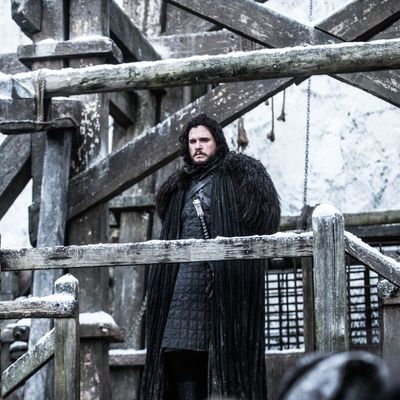
The late, lamented Daenerys Targaryen ultimately did not succeed in her goal to ÔÇ£break the wheel,ÔÇØ so accordingly, plenty of characters in the Game of Thrones series finale saw their arcs come full circle. Brienne has once again sworn her life to defend a monarch. Tyrion is once again Hand of the King. And, in some of the episodeÔÇÖs most poetic irony, Jon Snow has once again joined the NightÔÇÖs Watch.
As Tyrion pointed out by paraphrasing ÔÇ£Calvin and Hobbes,ÔÇØ itÔÇÖs a good compromise because it leaves everybody mad: DaenerysÔÇÖs allies are upset that Jon wonÔÇÖt be executed for murdering their queen in cold blood; the Starks are upset that the former King in the North is being punished for preventing the bevy of war crimes that seemed liable to occur under DanyÔÇÖs rule. So now, for the second time in as many lives, Jon finds himself shipped up to Castle Black, under slightly more duress than his first go-round.
Personally, I laughed out loud at the development, but IÔÇÖve encountered many viewers who are a bit confused. The NightÔÇÖs Watch was created to guard the realms of men from the threat of the White Walkers, and over the centuries, its primary mandate gradually became guarding against Wildling raids. Now that the Walkers and their zombie army are no more, and the Wildlings are allied to the communities south of the Wall, whatÔÇÖs even the point of anyone taking the black anymore?
Well, itÔÇÖs worth pointing out that the Wall and the Watch were created after the first invasion of the White Walkers, in an event known as the Long Night. (For more information on the Long Night, tune in to HBO in a couple of years.) To quote another genre show with a controversial finale, all of this has happened before, and it may happen again. If it does, it might help to have someone around to keep watch. And also, you know, patch up the gigantic hole in the Wall where the army of the dead came through.
And, as we saw in the finaleÔÇÖs closing sequence, Jon decided to accompany Tormund and the other Wildlings on their trip back to their homelands above the Wall. Why are the Wildlings returning North anyway? You may recall from season three that the Wildlings were only invading in the first place to avoid the White Walkers. Now that the threat is gone, at least in the short term, the Wildling diaspora is returning to its roots. Despite the available land offered to them in the Gift, the Wildlings have chafed at the hierarchical social system of the Six Kingdoms and the North. (ThereÔÇÖs got to be a better way to say that. SKATN?) Settling back in the lands of their ancestors, where they can continue to practice the culture they have for thousands of years, must seem a much more attractive choice, especially after the massive social trauma theyÔÇÖve suffered in the past few seasons.
IÔÇÖve spoken to a few viewers who are convinced that Jon is joining them in the final scene ÔÇö that heÔÇÖs not just helping them get settled, but once again abandoning his post to live as a Wildling full time. This seems a misreading of JonÔÇÖs character, to me. When it came to the Wildlings, Jon was never a Dances With Wolves/Last Samurai/Avatar figure, the civilized hero who spends time with a community of noble savages and becomes the best of them. Rather, his story was all about being able to integrate the value systems of the Wildling and Northern cultures, seeing the downsides and benefits of each, and mediating between them. It seems more likely that Jon will continue that role as Lord Commander of the NightÔÇÖs Watch, a diplomatic liaison between two neighboring peoples who are no longer at war but still have plenty of fundamental cultural differences. As the saying goes, walls make good neighbors, but it still doesnÔÇÖt hurt to have someone in charge who can see both sides.


